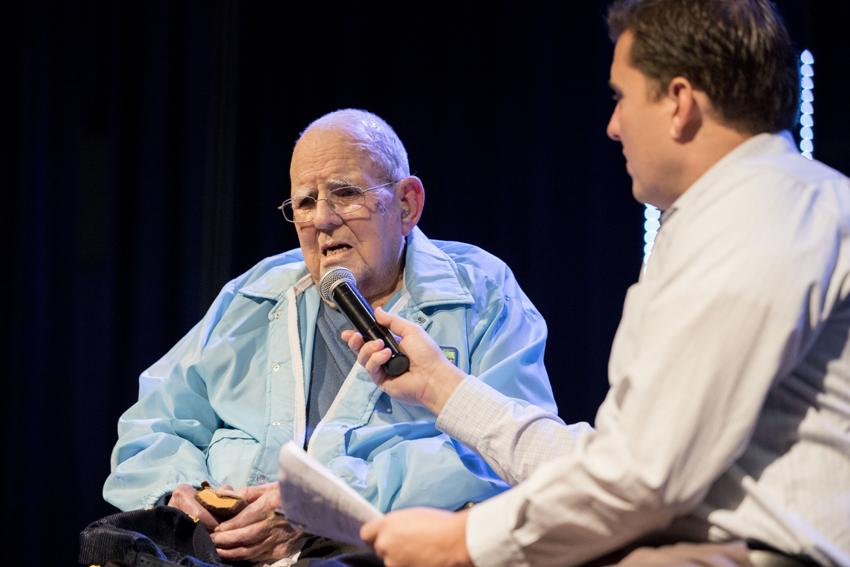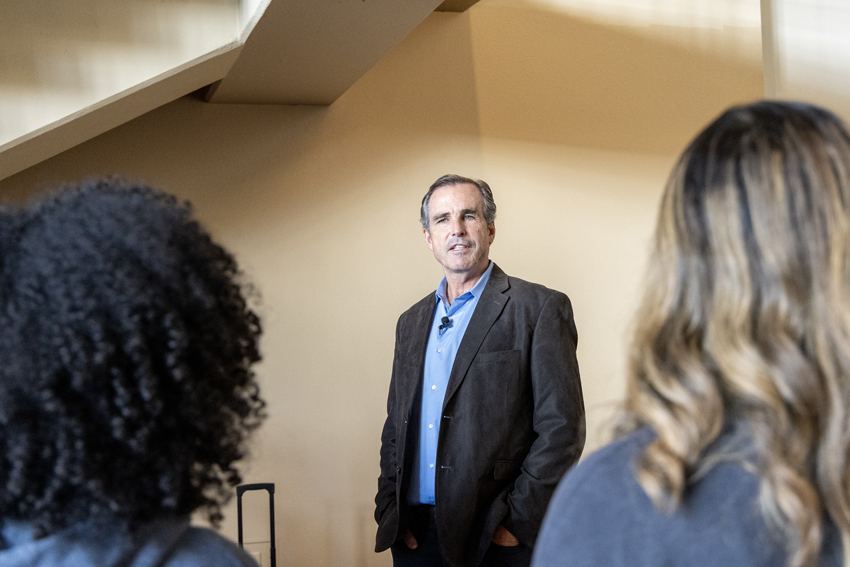Veteran overcomes injuries, keeps promise

Soldiers trekked through the snow, bundled up to keep out the bitter cold. In the distance artillery boomed like thunder, threatening anyone who dared approach. While people may be able to picture this event in their minds based off of war films or documentaries, World War II veteran George Poplin knows the scene all too well.
Each year in honor of Veterans Day, Paul Loeffler, the host of local radio show Hometown Heroes, invites a local WWII veteran to speak at chapel, Nov. 7. This year he interviewed George Poplin, the great-grandfather of three FC students.
Brynnor Poplin, ’22, George’s great-grandson, appreciates what his great-grandfather sacrificed for him and the nation.
“When I first heard that he was coming, I thought that it was pretty cool that my own grandpa would speak in a chapel,” Brynnor said. “I look up to him because he is brave. He has been through a lot of hardships in his life.”
It was an honor to interview WWII veteran George Poplin. Remember this weekend the sacrifice veterans made for us. #VeteransDay2017 @thefeather @P356Loeffler https://t.co/zTvewIlMzs
— Mariana Fikse (@MarianaFikse) November 10, 2017
George Poplin grew up on his family farm in the small town of Meeker, Oklahoma. While his family endured hardships during the Great Depression, Poplin still found ways to entertain himself with games such as throwing corn cobs with feathers attached to them over a barn roof.
However, trouble soon came to the Poplin house when George’s mother was diagnosed with cancer. Shortly after that, on December 7, 1941, Pearl Harbor was attacked by the Japanese and the United States entered WWII.

Due to the fact that his mother was ill, Poplin was not initially drafted into the military. However, when his mother passed away shortly thereafter, Poplin received a draft notice. This was only a few days after he got married.
“I got married and three weeks later I went in the service,” Poplin said. “I had no idea how long I would be away from my family. She (my wife) came in when I was doing basic training for about six weeks. I had two weeks vacation at home before we headed for overseas. I never heard a word from family from the time I left their house until I got back to the States about 8 months later.”
After spending time in basic training, Poplin was deployed to Europe where he served on a machine gun crew with Company H, 9th Infantry Regiment, 2nd Infantry Division as a replacement.
On Christmas Eve of 1944, Poplin made a promise with God in which he pledged to follow God for the rest of his life if He would get him through the war alive.
Poplin arrived on the front lines during the Battle of the Bulge, the Germans last major offensive stand and the third deadliest battle for Americans during the war. Poplin recalls the extreme cold weather conditions the soldiers endured.
“We were in dug trenches and slept under branches and stuff, it was fairly warm in there but outside it got really cold,” Poplin said. “I had two overcoats on the day I got hit, that’s how cold it was. War is scary, but you just followed directions. If you could hear the bombs over your head you were fine, it’s when they landed out in front of you, that’s when you’ve got problems.”
Poplin was in combat for 45 days before he was hit by a German mortar while he and a partner were walking to a Jeep. The company did not expect the Germans to attack, as they believed they had surrendered the night before.
“We didn’t know (they were going to attack) because the night before they were on a hill and they raised a white flag, so we assumed that they surrendered,” Poplin said. “Then in the morning I was on guard duty, and they brought hot breakfast down to us that morning, first time in a month. This other fella and I brought food in hot and we were carrying those back to the Jeep. I was in the back, he was in the front and a mortar shell landed in between us.”
Initially, after being hit, Poplin did not realize the extent of his injuries.

“It knocked me down and I stood up, and there were some servicemen there,” Poplin said. “I said, ‘Would you get my helmet for me, I lost my helmet’ and they said, ‘You don’t need a helmet, you need an aid station.’ They put me in a Jeep, and I went to the aid station. When you’re full of morphine, not much goes through your mind. I couldn’t write because both arms were in a cast, so she (the nurse) wrote a letter home, and it got there before the government’s telegram did.”
Poplin spent the rest of the war in several hospitals across Europe. The shrapnel had severely injured his arms, and he had to spend months with both arms in casts. He still bears the scars of his injuries and has limited use of his hands.
After the war ended, Poplin’s injuries prevented him from coming home as soon as some of the other soldiers did. However, once he proved he could eat on his own, he was able to go back to return home.
It was not until after he arrived in America that all of the mail his family had been sending to him caught up with him. He had gone months without hearing anything from his wife and family.
Poplin eventually found work as a teacher and taught a typing class. He was able to type 80 words per minute despite his injuries hindering some movement in his fingers.

After the war, Poplin still felt a resentment towards the Germans, as many returning veterans did. It was not until a trip to Germany in 1993 that Poplin changed his mentality towards the nation and its people.
“In 1993, my wife and I went to Germany because it was their city’s 1,200th birthday,” Poplin said. “I had some thoughts about going, but I’ve never been treated so good before in my life. This couple took us in and took us everywhere, showed us all the sites, took us to our meetings and things it was just a different experience than you would have expected. My view of the Germans changed tremendously.”
Poplin’s grand daughter Richelle Iest (Poplin) attended chapel to hear her grandpa’s story.
“Growing up, he didn’t talk much about the details of his time in WWII,” Iest said. “We always knew that grandpa had 2 elbows because he was hit in the war. It has been so neat to hear about the details of his story through his Hometown Heroes interview and interview at FCS chapel.
“I loved his story in chapel,” Iest said. “I think that is so special that he still has his Gideon Bible. It was given to him before he left for Germany. He had it on him when he was injured. He still has it to this day. I love how he said that Jesus was his Salvation and how he was so grateful to God. He promised to serve him if he survived, and he kept his promise.”
Poplin eventually did keep his end of the promise he made to God in 1944 by serving in his church as a deacon and as an elder for many decades. He still hands out bulletins every week to the people who attend his church.
For more veteran-inspired stories, listen to Hometown Heroes Radio and Paul Loeffler’s blog posts plus the Nov. 11 Veterans Day 2017 interviews, including Mariana Fikse’s interview with George Poplin (George Poplin’s part starts at the 35:02 mark and the Mariana speaking segment begins at the 39:30 mark). Just scroll through the blog post to find more interviews. Special thanks to Paul Loeffler for helping organizing the interviews. Readers can also follow Hometown Heroes Radio via Facebook.
For more about veterans, check out PROMO: 98th Annual Fresno Veterans Day Parade, Nov. 11 and 97th annual Veterans Day Parade spotlights Marine Corp. For more articles, read Thor Raganrok exceeds expectations due to audiences reactions.
Slideshow images below from Hometown Heroes Radio host, Paul Loeffler interviewing WWII veteran George Poplin.
[rev_slider alias=”wwiiveterangeorgepoplin”]





Marie Fikse • Nov 12, 2017 at 8:05 pm
Thank you Mr. Poplin for your service, it is inspiring to hear your amazing story.
I really enjoyed reading this article, great job Mariana.